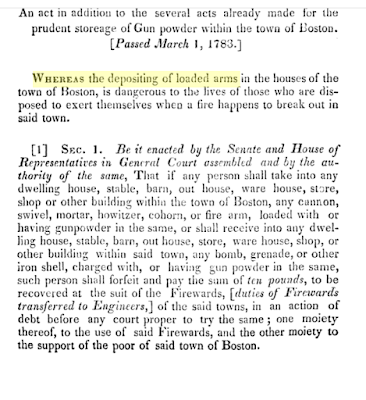I listened to Cal. Dep. A-G question Prof. Saul Cornell about how pre-1789 laws provided analogs to California's Unsafe Handgun Act, which requires a drop test different from the industry standard and therefore another cost to add to getting a handgun on the roster of lawful for civilians to buy handguns. (Police can buy whatever "unsafe" handgun they want.) It also requires a magazine disconnector and a loaded chamber indicator that makes me think of either the 1960s Batman TV show (with the garish effects around the words "POW!!!") or the Mask. Fine for TV but not really needed on a gun.
His analogs? Massachusetts adopted a barrel proofing law, you fire a ball with 4x the usual charge to verify it is safe. Gunpowder storage laws that limited how much black powder you could store in your home instead of the public magazine, 28 pounds and 30 pounds being typical limits.
Fortunately, I was able to respond to Cornell's claims and it was fun in an exhausting sort of way. His Exh. 24 included the New York City gunpowder storage law. But the actual law is at 2 Laws of New-York 191-93 (1792), and he copied from volume 1, a law organizing city governments. He did not even read it carefully enough to notice. You lucky California taxpayers are paying $500/hour for that expertise.
He claimed that proofing law from 1805 was passed in the biggest gunmaking state in America. So I pulled the 1810 Census of Manufactures and Massachusetts does not even have any makers.



So, unloaded cannon were okay?
ReplyDelete